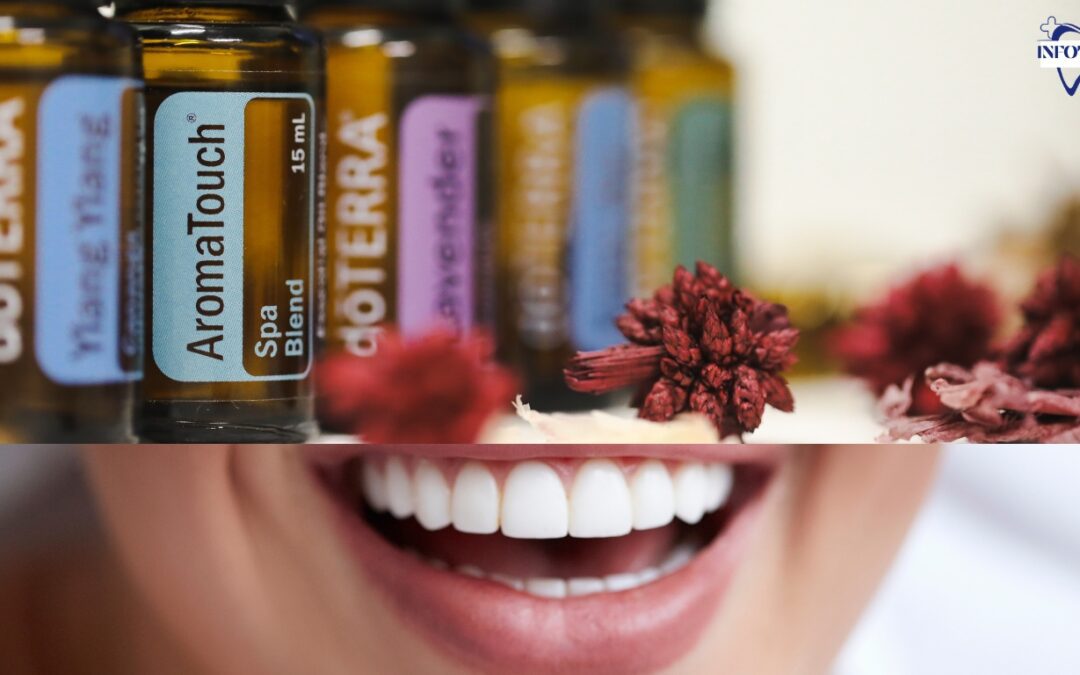Essential Oils For Teething can be difficult for parents and babies to go through the teething process. This developmental milestone can cause discomfort and impatience, which can leave everyone in the household feeling a little stressed. Even though there are conventional teething therapies available, a growing number of parents are using natural options, like essential oils, to ease the pain.
Table of Contents
This post will discuss essential oils and how they might be a secure and useful solution for relieving teething discomfort.
What are the tips of Teething essential oil recipe?
For both parents and infants, the teething time can be difficult, but the calming effects of Essential Oils For Teething can help make the process easier to handle. The unique requirements of teething babies must be carefully taken into account when creating a safe and effective essential oil combination. The calming virtues of chamomile, the soothing effects of lavender, and the mild analgesic capabilities of clove are combined in a well-liked teething essential oil combination.
Start with a foundation of carrier oil, like almond or coconut oil, to make this combination used as Essential Oils For Teething. Next, add one drop of chamomile oil, which has calming and anti-inflammatory qualities. Chamomile relieves gum inflammation and induces relaxation. Add one drop of lavender oil, which is renowned for having a mild and relaxing scent, after that. In addition to promoting relaxation, lavender helps provide deeper sleep, which is especially beneficial during teething discomfort.

Finally, add one drop of clove oil, which has inherent analgesic qualities to reduce discomfort. Because clove oil is so strong, it should be used very rarely and diluted. After combining all the ingredients, gently massage the diluted mixture along the baby’s jawline, taking care not to get any in their mouth or eyes.
This mix of teething essential oils offers a comprehensive and fragrant way to reduce discomfort associated with teething. Prioritise safety at all times by speaking with a paediatrician before introducing essential oils to your child. Make sure the oils are diluted properly to create a solution that is both mild and effective.
Several types of Essential oils for teething
Chamomile Oil:
Known for its relaxing effects, chamomile oil is a natural solution used as Essential Oils For Teething. The anti-inflammatory properties of this mild essential oil may soothe babies’ sore gums. During the teething process, chamomile oil, diluted with a carrier oil, can be placed along the baby’s jawline to relieve pain and encourage calmness. For safe usage, get advice from a paediatrician at all times.
Lavender Oil:
Known for its relaxing qualities, lavender oil provides mild relief for infants experiencing teething pain. A diluted drop of lavender oil rubbed along the baby’s jawline can help relieve gum discomfort because of its calming scent. This home cure not only reduces discomfort but also creates a calm atmosphere, which helps with relaxation during the difficult teething stage.

Peppermint Oil:
Due to its inherent analgesic qualities and cooling effect, peppermint oil used as Essential Oils For Teething and can be a calming treatment for newborns experiencing teething pain. A tiny amount of peppermint oil, suitably diluted with a carrier oil, can be applied externally along the baby’s jawline. This soothing application provides relief from gum pain during the teething phase.
Clove Oil:
Made from the clove plant, clove oil is a well-liked home cure for teething pain. It works well to relieve the pain associated with infant teeth erupting thanks to its inherent analgesic qualities. A tiny amount of clove oil, diluted with a carrier oil appropriately, can be gently rubbed along the baby’s jawline to relieve irritations due to teething.
Ginger Oil:
Known for its anti-inflammatory qualities, ginger oil becomes a soothing companion during teething. It’s a great option for alleviating the discomfort of erupting teeth because of its inherent capacity to lessen gum swelling. Apply ginger oil to the baby’s jawline gently after diluting it with carrier oil to provide relief and a calming scent during this difficult developmental stage.

Which Are Essential oils for teeth whitening?
Tea Tree Oil:
Tea Tree Oil is being investigated more and more for tooth whitening due to its inherent antibacterial qualities. A drop of tea tree oil combined with baking soda, coconut oil, and coconut oil can make a homemade whitening paste. At the same time, it is not a replacement for professional whitening procedures. Tea tree oil has antimicrobial properties that may improve oral health. This mixture, when used sparingly, may help keep teeth looking their best. Nonetheless, prior to using such treatments, a dentist consultation is important.

Peppermint Oil:
Popular for its natural teeth-whitening powers and refreshing taste used as Essential Oils For Teething, peppermint oil also has antimicrobial qualities. Because of its antibacterial properties, it helps fight oral bacteria and keeps the mouth cleaner. In addition, the menthol in peppermint oil gives teeth a refreshing, cooling feeling.
Lemon Oil:
Because of its mild acidity and astringent qualities, lemon oil is a well-liked natural teeth-whitening treatment. It makes teeth appear whiter by dissolving surface stains. Using a clean cloth or cotton swab, apply a few drops of lemon oil mixed with a carrier oil to your teeth. Nevertheless, extreme caution is necessary since overuse might damage dental enamel.
Orange Oil:
Due to its possible teeth-whitening benefits, orange oil, which is made from orange peels, is becoming more and more well-known. Its natural ingredients, such as limonene, function as a gentle solvent that can aid in removing surface stains from teeth. A whiter grin could be achieved by applying a small amount of orange oil mixed with carrier oil.

Eucalyptus Oil:
Known for its cooling and antibacterial qualities, eucalyptus oil is occasionally included in teeth-whitening treatments and also used as Essential Oils For Teething. A few drops of eucalyptus oil can be added to toothpaste or a homemade teeth-whitening concoction because of its natural cleaning properties. Because of its antibacterial properties, it helps keep the mouth cleaner by battling oral bacteria.
Is clove oil safe for babies teething?
Careful thought needs to be given to the question of clove oil safety for teething babies. Although clove oil has natural analgesic qualities that can help reduce pain and suffering, it must be applied and diluted carefully when using it on infants.
Eugenol, a substance recognized for its ability to reduce pain and inflammation, is found in clove oil, which is made from the cloves of the Syzygium aromaticum plant. But be careful—clove oil is quite strong; dilute it well before applying it to a baby’s gums.

Clove oil can be a component of a comprehensive teething relief strategy when used appropriately and sparingly. It’s generally accepted that one drop of clove oil diluted in a carrier oil, like almond or coconut oil, is harmless. It is crucial to remember that overuse or application without diluting the substance might result in negative consequences such as skin irritation and possible poisoning.
It is very important to speak with a paediatrician before adding clove oil to a teething regimen. As every infant is different, so too can their sensitivity levels. In order to maximize the possible advantages of clove oil while maintaining the baby’s safety, the paediatrician can offer tailored advice on the proper dilution ratios and frequency of administration. Black line on teeth also treated by clovie oil.
Conclusion
Including Essential Oils For Teething can be a safe and efficient method to soothe them. But always proceed with caution and seek advice from a medical expert. Since every infant is different, what suits one may not suit another. You may get through this difficult stage with confidence if you keep yourself informed and take into account a range of teething solutions.
FAQs
Q: Can I teethe with any essential oil?
A: No, not every essential oil is suitable for infant use. A paediatrician should be consulted before utilising any essential oils
Q: How often should I use the blend of teething oils?
A: When using the teething oil blend, use it carefully and watch your baby’s reaction. When in doubt, get advice from a medical expert.
Q: Do newborns have any age restrictions when it comes to utilising essential oils?
A: Generally speaking, babies younger than three months old shouldn’t be exposed to essential oils. Seek expert counsel at all times.
Q: If my kid is currently utilising teething toys, can I still use essential oils?
A: Essential oils do work well in addition to traditional teething therapies. For maximum comfort, make sure your approach is well-balanced
Q: What should I do in the event that my infant reacts negatively to essential oils?
A: As soon as possible, stop using it and get medical help. Patch tests should always be carried out before broad deployment.

